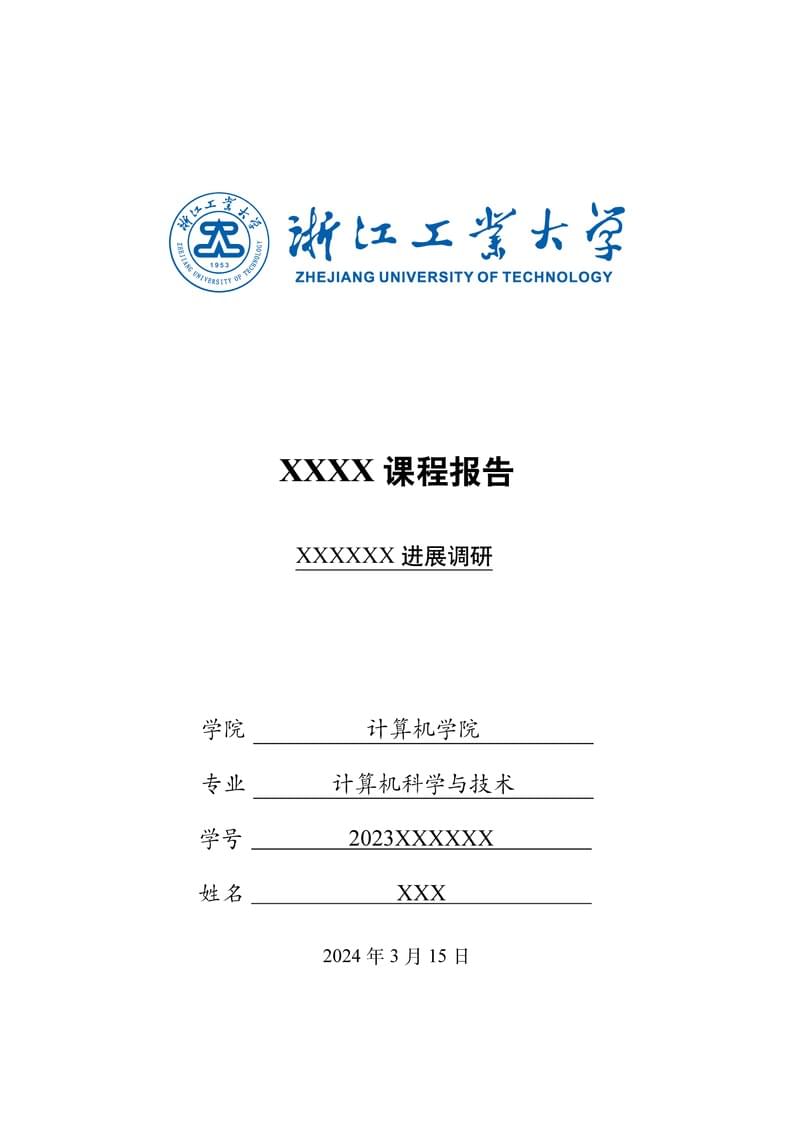
ZJUT_Report_LaTeX_Template
Autor:
GDY
Last Updated:
hace 2 años
License:
Creative Commons CC BY 4.0
Resumen:
浙江工业大学 课程报告模版 ZJUT Report template

\begin
Discover why over 25 million people worldwide trust Overleaf with their work.

\begin
Discover why over 25 million people worldwide trust Overleaf with their work.
%!TeX program = xelatex
\documentclass[12pt,hyperref,a4paper,UTF8]{ctexart}
\usepackage{ZJUTReport}
\usepackage{listings}
\usepackage{xcolor}
\usepackage{setspace}
\setstretch{1.5} % 设置全局行距为1.5倍
\usepackage{enumitem} % 载入enumitem包以便自定义列表环境
\setlist[itemize]{itemsep=0pt, parsep=0pt} % 设置itemize环境的项目间距和段落间距
\setmainfont{Times New Roman} % 英文正文为Times New Roman
%封面页设置
{
%标题
\title{
\vspace{1cm}
\heiti \Huge \textbf{{XXXX课程报告}} \par
\vspace{1cm}
\heiti \Large {\underline{XXXXXX进展调研}}
\vspace{3cm}
}
\author{
\vspace{0.5cm}
\kaishu\Large 学院\ \dlmu[9cm]{计算机学院} \\ %学院
\vspace{0.5cm}
\kaishu\Large 专业\ \dlmu[9cm]{计算机科学与技术} \\ %班级
\vspace{0.5cm}
\kaishu\Large 学号\ \dlmu[9cm]{2023XXXXXX} \qquad \\ %学号
\vspace{0.5cm}
\kaishu\Large 姓名\ \dlmu[9cm]{XXX} \qquad \\ %姓名
}
\date{\today} % 默认为今天的日期,可以注释掉不显示日期
}
%%------------------------document环境开始------------------------%%
\begin{document}
%%-----------------------封面--------------------%%
\cover
\thispagestyle{empty} % 首页不显示页码
%%------------------摘要-------------%%
\newpage
\begin{abstract}
在此填写摘要内容
\end{abstract}
\thispagestyle{empty} % 首页不显示页码
%%--------------------------目录页------------------------%%
\newpage
\tableofcontents
% \thispagestyle{empty} % 目录不显示页码
%%------------------------正文页从这里开始-------------------%
\newpage
\setcounter{page}{1} % 让页码从正文开始编号
%%可选择这里也放一个标题
%\begin{center}
% \title{ \Huge \textbf{{标题}}}
%\end{center}
\section{模板说明}
本模板主要适用于一些课程的平时论文以及期末论文,默认页边距为2.54cm和3.18cm,中文宋体,英文Times New Roman,字号为12pt(小四)。
编译方式:\verb|xelatex -> bibtex -> xelatex*2|
默认模板文件由以下四部分组成:
\begin{itemize}
\item \texttt{main.tex} 主文件
\item \texttt{reference.bib} 参考文献,使用bibtex
\item \texttt{ZJUTReport.sty} 文档格式控制,包括一些基础的设置,如页眉、标题、学院、学号、姓名等
\item \texttt{figures} 放置图片的文件夹
\end{itemize}
第一次使用时需前往\texttt{ZJUTReportReport.sty} 对标题、姓名、学号、页眉等进行设置,设置完后即可一劳永逸,封面LOGO亦可替换。
默认带有封面页,页码从正文开始。
\section{一些插入功能}
\subsection{插入公式}
行内公式$v-\varepsilon+\phi=2$。
插入行间公式如\autoref{Euler}:
\begin{equation}
v-\varepsilon+\phi=2
\label{Euler}
\end{equation}
\subsection{插入图片}
学校图书馆如\autoref{Library}所示,注意这里使用了\verb|~\autoref{}|命令,也就是会自动生成“图”“式”等前缀,无需手动输入。
\begin{figure}[!htbp]
\centering
\includegraphics[width =.9\textwidth]{figures/zjut_library.jpeg}
\caption{浙江公园大学图书馆}
\label{Library}
\end{figure}
插入上面图片的代码:
\begin{verbatim}
\begin{figure}[!htbp]
\centering
\includegraphics[width =.9\textwidth]{figures/zjut_library.jpeg}
\caption{浙江公园大学图书馆}
\label{ZJUT}
\end{figure}
\end{verbatim}
\subsection{插入文本框}
本模板定义了一个圆角灰底的文本框,使用简化命令\verb|\tbox{}|即可,如果你不喜欢,可以前往 \texttt{ZJUTReport.sty}对其进行修改。
\tbox{
这是一个圆角灰底的文本框
}
\subsection{插入表格}
本模板文件如表~\ref{doc} 所示。
\begin{table}[!htbp]
\centering
\begin{tabular}{l | l}
\hline
文件名 & 说明 \\
\hline
\texttt{main.tex} & 主文件 \\
\texttt{reference.bib} & 参考文献 \\
\texttt{BUAAReport.sty} & 文档格式控制\\
\texttt{figures} & 图片文件夹 \\
\hline
\end{tabular}
\caption{本模板文件组成}
\label{doc}
\end{table}
%\section{定理环境}
%\begin{Theorem}
%\end{Theorem}
%
%\begin{Lemma}
%\end{Lemma}
%
%\begin{Corollary}
%\end{Corollary}
%
%\begin{Proposition}
%\end{Proposition}
%
%\begin{Definition}
%\end{Definition}
%
%\begin{Example}
%\end{Example}
%
%\begin{proof}
%\end{proof}
\subsection{插入高亮代码块}
利用\verb|lstlisting| 配置
\begin{lstlisting}[style=CPP, title="c++代码"]
#include <iostream>
#include <array>
int main()
{
constexpr int MAX = 100;
std::array<int, MAX> arr;
}
\end{lstlisting}
\begin{lstlisting}[style=Java, title="Java代码"]
public void addAdvertisement(String company, String ad_Category, String ad_Type, String ad_Price)
{
int price = Integer.parseInt(ad_Price);
ad = new Advertisement(company, ad_Category, ad_Type, price);
adList.add(index, ad);
index++;
anDM = getDefaultDirectoryManager();
ActorTuple tuple = new ActorTuple(getActorName(), "advertiser",
company, ad_Category, ad_Type, price, index-1);
send(anDM, "register", tuple);
}
\end{lstlisting}
\begin{lstlisting}[style=Python, title="Python代码"]
import random
import collections
Card = collections.namedtuple('Card', ['rank', 'suit'])
class FrenchDesk:
ranks = [str(n) for n in range(2, 11)] + list('JQKA')
suits = 'spades diamonds clubs hearts'.split()
def __init__(self):
self._cards = [Card(rank, suit) for rank in self.ranks for suit in self.suits]
def __len__(self):
return len(self._cards)
def __getitem__(self, position):
return self._cards[position]
desk = FrenchDesk()
\end{lstlisting}
\subsection{插入参考文献}
直接使用\verb|\cite{}|即可\cite{DBLP:conf/nips/VaswaniSPUJGKP17}。
例如:
\textit{ 此处引用了文献}
\cite{DBLP:conf/nips/VaswaniSPUJGKP17}。此处引用了文献\cite{DBLP:conf/nips/VaswaniSPUJGKP17}
引用过的文献会自动出现在参考文献中。
\section{写在最后}
\subsection{发布地址}
\begin{itemize}
\item Github: \url{https://github.com/zjutcvg/ZJUT_Report_LaTeX_Template}
\end{itemize}
%%----------- 参考文献 -------------------%%
%在reference.bib文件中填写参考文献,此处自动生成
\reference
\end{document}